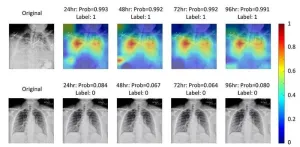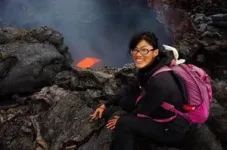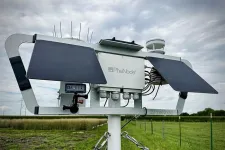(Press-News.org) The COVID-19 pandemic dealt a huge blow to healthcare systems and highlighted their major shortcomings. As of June 2023, there have been over 760 million confirmed cases of COVID-19, with almost 7 million deaths worldwide. During the major COVID-19 outbreaks, hospitals often had their intensive care units (ICU) running at full capacity for providing invasive mechanical ventilation to patients who were diagnosed as positive for COVID-19. These ICUs often operated with insufficient staff and intubation equipment.
One way to mitigate such problems is to accurately predict the prognosis of patients who test positive for COVID-19. Doctors generally use chest X-ray radiography (CXR) images to assess the condition of patients. By analyzing signs of pneumonia in these images, they can infer if the patient is likely to need admission to the ICU soon. In turn, this can help with optimal allocation of hospital resources. Unfortunately, this process is labor intensive, time consuming, and suffers from variability in diagnoses, which is a major issue especially during large outbreaks.
But what if artificial intelligence (AI) gave us a helping hand? In a recent study published in the Journal of Medical Imaging, a team of researchers from the Department of Radiology of the University of Chicago has developed a deep learning-based model that can predict if a patient will need intensive care by analyzing their CXR images.
One of the defining features of the proposed approach was the use of a technique called “transfer learning.” Developing deep learning models for medical imaging applications is especially challenging because of the sheer amount of annotated data required for training. Thus, instead of training a model from scratch with millions of images, one can use transfer learning to pass knowledge from a pretrained model to another model. The idea is to fine-tune the receiving model using a dedicated dataset so that the “expertise” of the previous model can be leveraged for a new task. For example, with transfer learning, a model trained to detect a specific disease in magnetic resonance images can serve as the basis for another model aimed at detecting a different disease.
Utilizing this strategy, the researchers employed a sequential transfer learning process to develop their final model. They first fine-tuned a large model, pretrained on ImageNet with 1.2 million natural images, using CXR images from a National Institutes of Health dataset to detect 14 different diseases. After that, the researchers refined this model using a dataset from the Radiological Society of North America to detect pneumonia. Lastly, they fine-tuned it using an in-house dataset, which contained 6,685 CXR images from 3,998 patients with COVID-19.
The developed AI model could predict whether a patient with COVID-19 would need intensive care within 24, 48, 72, and 96 hours of the CXR exam with a good degree of accuracy. In an independent in-house test set (1,672 CXR images from 1,048 patients), it achieved an area under the receiver operating characteristic curve of 0.78 when predicting the need for intensive care 24 hours in advance, and at least 0.76 for 48 or more hours, with patients identified by the model as high risk being almost five times as likely to require intensive care. Interestingly, the proposed model’s performance was comparable to similar existing models, even though it relied only on CXR images instead of a combination of images and clinical data.
Overall, this model could fill an important gap in clinical practice. While many machine learning models were developed to diagnose COVID-19, few were designed to predict the prognosis of patients. The proposed model, however, could play an essential role in supporting clinical decision-making and resource management, which in turn would improve the quality of care received by patients. Notably, the researchers are already working on improving this model in various ways. These include training the model with CXR images gathered at multiple institutions, incorporating relevant clinical variables into the model, extending the model to include lung opacities caused by related diseases, and adding image segmentation and preprocessing steps.
Here’s hoping that these efforts surely lead to better clinical outcomes for patients with COVID-19 during a pandemic!
Read the Gold Open Access article by Li, Drukker, et al., “Predicting intensive care need for COVID-19 patients using deep learning on chest radiography,” J. Med. Imag. 10(4) 044504 (2023), doi 10.1117/1.JMI.10.4.044504.
END
AI to predict critical care for patients with COVID-19
Researchers developed a deep-learning model to assess chest X-ray radiographs for probable COVID-19 severity
2023-08-21
ELSE PRESS RELEASES FROM THIS DATE:
Simple blood test may predict future heart, kidney risk for people with Type 2 diabetes
2023-08-21
Research Highlights:
An analysis of a clinical trial of more than 2,500 people with Type 2 diabetes and kidney disease found that high levels of four biomarkers are strongly predictive for the development of heart and kidney issues.
People who took canagliflozin, a sodium glucose co-transporter 2 inhibitor (SGLT2 inhibitor), had lower levels of the four biomarkers compared to those who took a placebo over the three-year study period.
Treatment with canagliflozin helped to substantially reduce the risk of hospitalization for heart failure and other heart complications among patients considered to have the highest risk.
Embargoed until 1 p.m. CT/2 p.m. ET Monday, ...
Listening for “sounds” from the far corners of space
2023-08-21
Scientists spectacularly confirmed the existence of gravitational waves several years ago, but now they are searching the cosmos for new and different types of these waves that result from different objects in deep space.
Benjamin Owen, a professor in the Department of Physics and Astronomy at Texas Tech University, was recently awarded a three-year National Science Foundation (NSF) grant that aims to uncover and confirm additional types of gravitational waves.
“So far with gravitational waves we’ve seen what happens when you have ...
Agrela Ecosystems ignites innovation in data-driven agriculture
2023-08-21
ST. LOUIS, MO, August 21, 2023 – Agrela Ecosystems, a startup launched by Nadia Shakoor, PhD, principal investigator, at the Donald Danforth Plant Science Center announced the pilot launch of its flagship product, PheNodeTM. This milestone marks the first step towards a full-scale commercial release set for 2025. PheNode is an advanced, scalable environmental sensor platform designed to empower users with customizable data collection and the rapid integration of new technologies. Already creating a buzz, the platform is now collecting data and generating customer feedback, ...
PS gene-editing shown to restore neural connections lost in brain disorder
2023-08-21
MINNEAPOLIS/ST. PAUL (08/21/2023) — A new study from the University of Minnesota is the first to demonstrate the ability for gene therapy to repair neural connections for those with the rare genetic brain disorder known as Hurler syndrome. The findings suggest the use of gene therapies — an entirely new standard for treatment — for those with brain disorders like Hurler syndrome, which have a devastating impact on those affected.
The study was published in the Nature journal Scientific Reports.
Hurler syndrome, also known as mucopolysaccharidosis type I (MPS I), is a genetic disorder affecting newborns ...
Argonne receives funding to use AI and machine learning for nuclear physics research
2023-08-21
The U.S. Department of Energy (DOE) announced $16 million for 15 projects that will implement artificial intelligence (AI) methods to accelerate scientific discovery in nuclear physics research. DOE’s Argonne National Laboratory will lead two of those projects and be a collaborator on another.
These projects will use AI and Machine Learning (ML) tools and methods for nuclear physics experiments, simulation, theory and accelerator operation to expand and accelerate scientific reach.
“Artificial intelligence has the potential to shorten the timeline ...
Bloom studying impact of exposure to perfluoroalkyl substances on weight loss
2023-08-21
Michael Bloom, Associate Professor, Global and Community Health, received $158,900 from the National Institutes of Health for the project: "Impact of Exposure to Perfluoroalkyl Substances on Weight Loss: A Pilot Study of Hispanic Children with Overweight/Obesity Participating in a Community-based Weight Loss Intervention Program."
In this pilot study, Bloom is evaluating associations between exposures to perfluoroalkyl substances (PFAS) and weight lost during a 10-week weight loss intervention among Hispanic children with overweight and obesity. He and his collaborators will quantify the association between 12 different PFAS ...
Schintler & collaborators to study perceptions of efficiency & bias in algorithmic versus human peer review
2023-08-21
Laurie Schintler, Associate Professor, Schar School of Policy and Government, is set to receive funding for the project: "Perceptions of Efficiency and Bias in Peer Review: Algorithmic versus Human Decision Making."
This project is a collaboration between the Schar School of Policy and Government (GMU) and the Department of Sociology and Anthropology (CHSS-GMU). The investigators on the team include:
PI Laurie A. Schintler;
Co-PI Connie L. McNeely, Professor, Schar School of Policy and ...
McDonald to investigate privacy ecosystems among vulnerable populations
2023-08-21
Nora McDonald, Assistant Professor, Information Sciences and Technology, is set to receive funding from the National Science Foundation for the project: "Collaborative Research: SaTC: CORE: Medium: Beyond App-centric Privacy: Investigating Privacy Ecosystems among Vulnerable Populations."
Prior research shows that people who have privacy concerns may be reluctant to access medical services. This is especially true for vulnerable populations, such as those who because of their gender, race, ethnicity, socio-economic status, or other marginalizations are more susceptible to privacy risk. These risks go beyond individual apps ...
Acosta & Burls using weather model & geologic data to test tectonic mechanisms in intercontinental setting
2023-08-21
Paul Acosta, Postdoctoral Scholar, Atmospheric, Oceanic and Earth Sciences (AOES), and Natalie Burls, Associate Professor, AOES; Graduate Program Director, Climate Dynamics, received funding from the National Science Foundation for the project: "Collaborative Research: Using a weather model and geologic data to test tectonic mechanisms in an intercontinental setting: The Altai Mountains of Central Asia."
This project seeks to apply new advances in atmospheric and geosciences to ...
Ye receives National Science Foundation CAREER Award
2023-08-21
Jinwei Ye, Assistant Professor, Computer Science, received funding for the project: "CAREER: Towards Polarimetric Visual Understanding."
In this project, Ye will study how the way surfaces reflect polarized light can be used to help recognize objects more effectively.
Ye will address the following two questions: (1) How does the polarization of light change after interacting with various types of surfaces? (2) What can polarized light tell us about the kinds of objects that it has interacted with?
Addressing these questions can lead to significant improvements in machine vision systems by strengthening their capability to do geometric ...
LAST 30 PRESS RELEASES:
Chimps’ love for crystals could help us understand our own ancestors’ fascination with these stones
Vaginal estrogen therapy not linked to cancer recurrence in survivors of endometrial cancer
How estrogen helps protect women from high blood pressure
Breaking the efficiency barrier: Researchers propose multi-stage solar system to harness the full spectrum
A new name, a new beginning: Building a green energy future together
From algorithms to atoms: How artificial intelligence is accelerating the discovery of next-generation energy materials
Loneliness linked to fear of embarrassment: teen research
New MOH–NUS Fellowship launched to strengthen everyday ethics in Singapore’s healthcare sector
Sungkyunkwan University researchers develop next-generation transparent electrode without rare metal indium
What's going on inside quantum computers?: New method simplifies process tomography
This ancient plant-eater had a twisted jaw and sideways-facing teeth
Jackdaw chicks listen to adults to learn about predators
Toxic algal bloom has taken a heavy toll on mental health
Beyond silicon: SKKU team presents Indium Selenide roadmap for ultra-low-power AI and quantum computing
Sugar comforts newborn babies during painful procedures
Pollen exposure linked to poorer exam results taken at the end of secondary school
7 hours 18 mins may be optimal sleep length for avoiding type 2 diabetes precursor
Around 6 deaths a year linked to clubbing in the UK
Children’s development set back years by Covid lockdowns, study reveals
Four decades of data give unique insight into the Sun’s inner life
Urban trees can absorb more CO₂ than cars emit during summer
Fund for Science and Technology awards $15 million to Scripps Oceanography
New NIH grant advances Lupus protein research
New farm-scale biochar system could cut agricultural emissions by 75 percent while removing carbon from the atmosphere
From herbal waste to high performance clean water material: Turning traditional medicine residues into powerful biochar
New sulfur-iron biochar shows powerful ability to lock up arsenic and cadmium in contaminated soils
AI-driven chart review accurately identifies potential rare disease trial participants in new study
Paleontologist Stephen Chester and colleagues reveal new clues about early primate evolution
UF research finds a gentler way to treat aggressive gum disease
Strong alcohol policy could reduce cancer in Canada
[Press-News.org] AI to predict critical care for patients with COVID-19Researchers developed a deep-learning model to assess chest X-ray radiographs for probable COVID-19 severity



